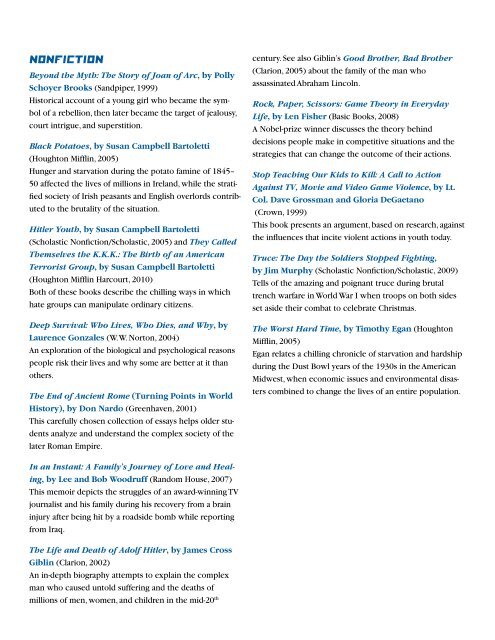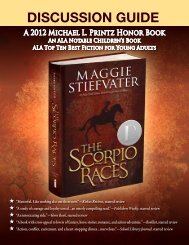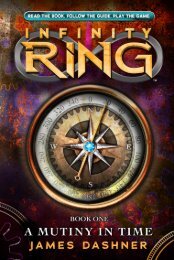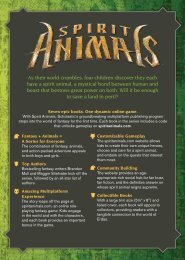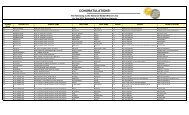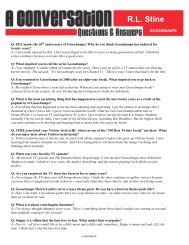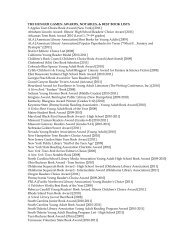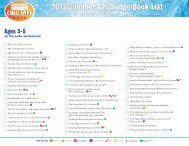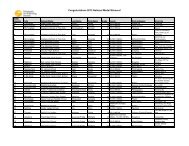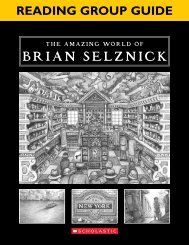Hunger Games Discussion Guide - Scholastic Media Room
Hunger Games Discussion Guide - Scholastic Media Room
Hunger Games Discussion Guide - Scholastic Media Room
You also want an ePaper? Increase the reach of your titles
YUMPU automatically turns print PDFs into web optimized ePapers that Google loves.
Nonfiction<br />
Beyond the Myth: The Story of Joan of Arc, by Polly<br />
Schoyer Brooks (Sandpiper, 1999)<br />
Historical account of a young girl who became the symbol<br />
of a rebellion, then later became the target of jealousy,<br />
court intrigue, and superstition.<br />
Black Potatoes, by Susan Campbell Bartoletti<br />
(Houghton Mifflin, 2005)<br />
<strong>Hunger</strong> and starvation during the potato famine of 1845–<br />
50 affected the lives of millions in Ireland, while the stratified<br />
society of Irish peasants and English overlords contributed<br />
to the brutality of the situation.<br />
Hitler Youth, by Susan Campbell Bartoletti<br />
(<strong>Scholastic</strong> Nonfiction/<strong>Scholastic</strong>, 2005) and They Called<br />
Themselves the K.K.K.: The Birth of an American<br />
Terrorist Group, by Susan Campbell Bartoletti<br />
(Houghton Mifflin Harcourt, 2010)<br />
Both of these books describe the chilling ways in which<br />
hate groups can manipulate ordinary citizens.<br />
Deep Survival: Who Lives, Who Dies, and Why, by<br />
Laurence Gonzales (W. W. Norton, 2004)<br />
An exploration of the biological and psychological reasons<br />
people risk their lives and why some are better at it than<br />
others.<br />
The End of Ancient Rome (Turning Points in World<br />
History), by Don Nardo (Greenhaven, 2001)<br />
This carefully chosen collection of essays helps older students<br />
analyze and understand the complex society of the<br />
later Roman Empire.<br />
century. See also Giblin’s Good Brother, Bad Brother<br />
(Clarion, 2005) about the family of the man who<br />
assassinated Abraham Lincoln.<br />
Rock, Paper, Scissors: Game Theory in Everyday<br />
Life, by Len Fisher (Basic Books, 2008)<br />
A Nobel-prize winner discusses the theory behind<br />
decisions people make in competitive situations and the<br />
strategies that can change the outcome of their actions.<br />
Stop Teaching Our Kids to Kill: A Call to Action<br />
Against TV, Movie and Video Game Violence, by Lt.<br />
Col. Dave Grossman and Gloria DeGaetano<br />
(Crown, 1999)<br />
This book presents an argument, based on research, against<br />
the influences that incite violent actions in youth today.<br />
Truce: The Day the Soldiers Stopped Fighting,<br />
by Jim Murphy (<strong>Scholastic</strong> Nonfiction/<strong>Scholastic</strong>, 2009)<br />
Tells of the amazing and poignant truce during brutal<br />
trench warfare in World War I when troops on both sides<br />
set aside their combat to celebrate Christmas.<br />
The Worst Hard Time, by Timothy Egan (Houghton<br />
Mifflin, 2005)<br />
Egan relates a chilling chronicle of starvation and hardship<br />
during the Dust Bowl years of the 1930s in the American<br />
Midwest, when economic issues and environmental disasters<br />
combined to change the lives of an entire population.<br />
In an Instant: A Family’s Journey of Love and Healing,<br />
by Lee and Bob Woodruff (Random House, 2007)<br />
This memoir depicts the struggles of an award-winning TV<br />
journalist and his family during his recovery from a brain<br />
injury after being hit by a roadside bomb while reporting<br />
from Iraq.<br />
The Life and Death of Adolf Hitler, by James Cross<br />
Giblin (Clarion, 2002)<br />
An in-depth biography attempts to explain the complex<br />
man who caused untold suffering and the deaths of<br />
millions of men, women, and children in the mid-20 th


